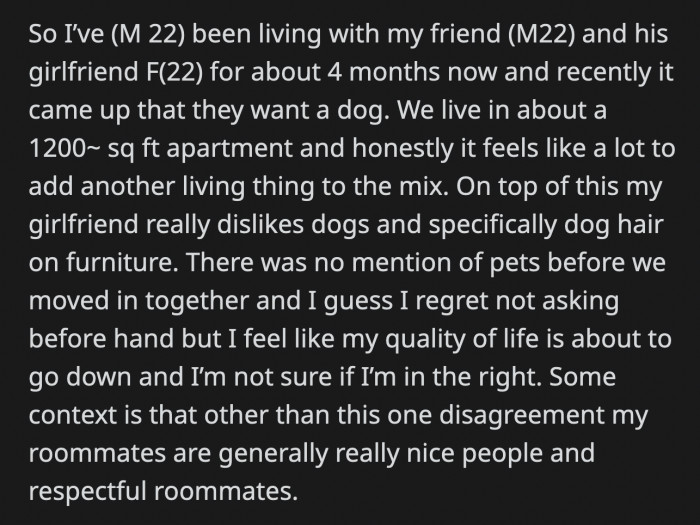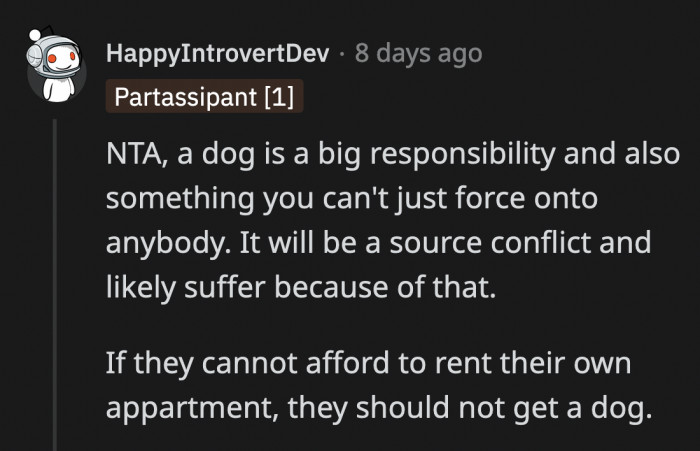Roommates Cannot Agree On Whether To Get A Dog Or Not, So Redditors Are Introducing Them To Conflict Resolution
As a kid, I couldn't wait to grow up, move out, and be free of the chores my parents imposed on me. This dream, to little old me, meant freedom, and I counted down the days until I was old enough to make my own decisions.
Little did I know, adulthood isn't all it's cracked up to be. I have more chores now than I did when I was young, and they never seem to end.
Long before I had the privilege of living by myself, I had to live with roommates in several tiny apartments. It can be fun growing up alongside people my age who are still trying to figure out their paths in life.
But if someone had given us the money to buy our own apartments then, not one of us would have thought twice and immediately jumped at the opportunity. Humans may be social beings, but dealing with people 24/7 in a small space is criminal.
Arguments, both petty and significant, are inevitable in that kind of setup, especially for a couple of 20-somethings who are overworked and underpaid. This Reddit post, shared by a 22-year-old guy, mirrors that kind of experience.
OP lives with his friend and girlfriend, who are the same age as he is. The couple recently told OP that they are planning to adopt a dog.
Their apartment is 1,200 sq. ft., and a boisterous dog is the last thing they need. OP's girlfriend, who doesn't live with them, also dislikes having dog hair trapped in the furniture.
OP regrets not asking his friends about wanting pets before moving in with them

He feels that his quality of life will diminish should they go through with their plan. Would OP be overstepping if he tells his roommates they can't get a dog?

OP's friends can't make a unilateral decision to get a dog without OP's agreement. They live in the same house for now and have to consider all three opinions.

Conflict Resolution in Shared Living Spaces
The disagreement between roommates over pet ownership reflects broader themes of conflict resolution and negotiation in shared living arrangements. Dr. Rachel E. Adams, a conflict resolution specialist at UC Berkeley, notes that many conflicts in shared spaces stem from differing values and priorities.
Understanding each other's perspectives is crucial for navigating these disagreements and finding common ground. Research shows that effective communication can significantly reduce tensions and foster cooperation among roommates.
Conflict Resolution in Shared Living Spaces
This scenario illustrates the challenges of conflict resolution in shared living situations, particularly when personal preferences clash. Research in social psychology indicates that misunderstandings often arise from differing perspectives on shared responsibilities. In this case, the roommates' inability to agree on whether to get a dog reflects deeper issues regarding communication and compromise. According to studies published in the Journal of Social Issues, effective conflict resolution strategies can help individuals navigate these challenges by fostering understanding and cooperation.
Recognizing these dynamics is essential for roommates to maintain harmony in their living situation.
His roommates are at least willing to shoulder the fee to allow a pet into the apartment, but the subsequent care is another discussion.

Do you have to be a homeowner to own a dog? Not really, but if you live with a roommate, they have a say in who or what can enter your home since it's a shared space.

You can bid your security deposit goodbye the moment you bring an energetic puppy home.

This situation also underscores the importance of compromise. Studies indicate that successful conflict resolution often involves finding middle ground that respects each individual's preferences. By discussing pet ownership openly, roommates can explore options that accommodate both parties' needs, fostering a sense of shared responsibility.
Utilizing conflict resolution strategies, such as brainstorming and collaborative problem-solving, can lead to more positive outcomes.
From a psychological perspective, the concept of compromise is crucial in resolving disputes among roommates. A study from the University of California, Berkeley emphasizes that successful compromise involves understanding each other’s needs and priorities. In this scenario, the roommates could benefit from discussing their feelings about pet ownership openly, identifying their concerns, and exploring potential solutions that respect both sides. This approach fosters a sense of shared ownership and responsibility within the household.
They can swear all the promises to be solely responsible for their pet, but there will come a day when OP has to take care of the dog because they have to work overtime or need a night off.

Adopting a dog they know OP doesn't want can be their passive-aggressive way of telling him they want him out of the apartment.

OP's name is on the lease, which means he has as much say as the other two regarding apartment-related decisions.

Establishing Guidelines for Shared Spaces
To facilitate healthy discussions about pet ownership, establishing clear guidelines is essential. Dr. William Ury, a negotiation expert, emphasizes the importance of setting ground rules in conflict situations. By outlining expectations for pet care and responsibilities, roommates can create a framework for cooperation.
For example, discussing how pet care duties will be divided can help prevent misunderstandings and promote accountability among housemates.
The Role of Communication in Roommate Dynamics
Effective communication is vital in maintaining healthy roommate relationships. A clinical psychologist notes that using active listening techniques can facilitate better understanding between roommates. For instance, each roommate can take turns expressing their views on pet ownership without interruption, allowing for a more comprehensive understanding of each other's perspectives. Research supports that active listening promotes empathy and reduces defensiveness, which can lead to more constructive conversations.
By fostering open communication, roommates can navigate their differences more effectively.
No one is really acting like a jerk yet. They are discussing pets, which can mean the end of their roommate relationship, but they have to sit down and discuss this issue like adults.

If OP is somehow persuaded to say yes to having a dog, it's good to put responsibilities in writing when issues relating to the dog come up in the future.

Problems are not that easy to discuss, especially for people like OP who are non-confrontational. However, a discussion is a must if they want to remain friends and roommates.
No one has behaved inconsiderately yet, and this is a good opportunity for them to practice their communication and conflict-resolution skills. Whether they continue living together with or without a dog will depend on their discussion.
Moreover, it’s essential to establish clear boundaries regarding shared responsibilities. Research from the Journal of Community Psychology indicates that clearly defined roles and expectations can significantly reduce conflict. In this case, the roommates might create a list of responsibilities related to pet care, ensuring that both parties understand their roles. Establishing these boundaries can create a sense of accountability and promote cooperation.
Practical Strategies for Compromise
To navigate differences in preferences, roommates can engage in structured discussions focused on finding common ground. Techniques from mediation can be useful in fostering collaboration. For example, they could outline the pros and cons of getting a dog, weighing their concerns against the benefits. Additionally, exploring alternative arrangements, such as pet-sitting for friends or volunteer opportunities at shelters, can provide a middle ground that respects both perspectives. Research indicates that collaborative problem-solving fosters stronger relationships and mutual respect among roommates.
Ultimately, these strategies can enhance their living situation and promote harmony.
Psychological Analysis
This situation highlights the common challenges faced by roommates when it comes to personal preferences and responsibilities. The inability to agree on pet ownership reflects deeper issues of communication and compromise. Fostering open discussions about each other's needs can help roommates navigate their differences and enhance their living experience.
Analysis generated by AI
Analysis & Alternative Approaches
In conclusion, understanding the dynamics of conflict resolution in shared living spaces is essential for fostering healthy relationships among roommates. By prioritizing communication and compromise, individuals can navigate their differences more effectively. Research supports that these efforts lead to greater satisfaction and cooperation in shared living environments.
Additionally, fostering a culture of respect and understanding can enhance roommate relationships. Research in social psychology suggests that building positive connections can significantly improve cooperation and reduce conflicts. Engaging in regular check-ins to address any concerns can create an atmosphere of openness and trust, further solidifying roommate bonds.
By prioritizing communication and respect, roommates can create a harmonious living environment that accommodates diverse preferences.
Analysis & Alternative Approaches
In conclusion, addressing conflicts over pet ownership requires effective communication and a willingness to compromise. According to research in conflict resolution, fostering a culture of respect and understanding can significantly enhance roommate dynamics.
By establishing clear guidelines and encouraging open dialogue, roommates can navigate disagreements more effectively and create a supportive living environment.



